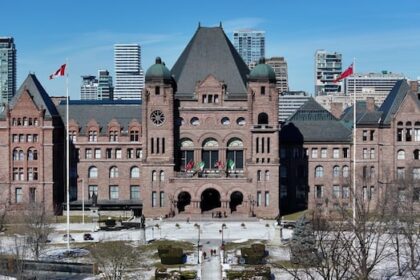Shock, disappointment and anger for many Atlantic Canadians over trade war, with many saying it will take a lot to rebuild trust in USPublished Mar 31, 2025 • 7 minute readSheila Clyburne, left, and Andy Sherin live in Nova Scotia but have strong ties to the United States. They’re among the Canadians devastated by the increasing tensions between the U.S. and Canada. ContributedPolitics has become an even more popular topic at dinner tables, bars and friendly gatherings, as even people who didn’t previously discuss matters of the state are now interested in what’s going on.U.S. President Donald Trump’s actions since he assumed office in January have directly affected Canadians. His on-again/off-again tariff plans and his widespread talk of annexation have led to a surge in solidarity with consumers looking for Canada-made goods at supermarkets.THIS CONTENT IS RESERVED FOR SUBSCRIBERS ONLY.Subscribe now to access this story and more:Unlimited access to the website and appExclusive access to premium content, newsletters and podcastsFull access to the e-Edition app, an electronic replica of the print edition that you can share, download and comment onEnjoy insights and behind-the-scenes analysis from our award-winning journalistsSupport local journalists and the next generation of journalistsSUBSCRIBE TO UNLOCK MORE ARTICLES.Subscribe or sign in to your account to continue your reading experience.Unlimited access to the website and appExclusive access to premium content, newsletters and podcastsFull access to the e-Edition app, an electronic replica of the print edition that you can share, download and comment onEnjoy insights and behind-the-scenes analysis from our award-winning journalistsSupport local journalists and the next generation of journalistsRegister to unlock more articles.Create an account or sign in to continue your reading experience.Access additional stories every monthShare your thoughts and join the conversation in our commenting communityGet email updates from your favourite authorsSign In or Create an AccountorArticle contentAnger, shock, disappointment and anxiety are pervasive emotions in Canada right now.According to Joe Hood of Sound Living N.S., the disappointment is mainly in American voters.“[Donald] Trump, doing as he is and discrediting the U.S.A., was foreseeable,” said the sustainable living advocate.The two countries have maintained close relations over decades. While the threat of a trade war hangs above everyone’s heads, for some Canadians, their relationship with the U.S. has more of a personal nature, too.Take Andy Sherin and Sheila Clyburne, for example — the husband and wife duo who live in Nova Scotia, but Clyburne’s grandmother worked in homes in Boston and she brought American children she cared for to Pictou County for the summer.“My mother was born in Rochester, NY, and we both still have relatives in the U.S.A.,” said Sherin.Their youngest daughter lives in Brooklyn, NY, and is a dual citizen. In fact, the U.S. was one of the top countries that Canadian citizens by birth reported also being citizens of in 2021, per a Statistics Canada report. Flags fly at the Canada-U.S. border near Surrey, B.C.. Photo by NICK PROCAYLO /PostmediaNot always friendly neighboursArticle contentSherin points out that despite historical political, business and more personal links between the two countries, tensions have been a feature, too.“We burned down the White House in the 1812 war. More recently, there has been ongoing softwood lumber disputes and [the] U.S. unhappiness with supply management restrictions,” he pointed out.For anyone who’s been paying attention to the U.S. election and Project 2025, the current strained relations won’t be a complete shock, adds Sherin.Beyond disappointments related to the negative impact on industries, jobs and families involved in trade with the U.S., Sherin pointed out that there is also grave sadness over other measures that have come into place since Trump became President.The vilification of DEI and the dismantling of USAID and other organizations like the National Oceanic and Atmospheric Administration and the National Institutes of Health are of particular concern, said Sherin. U.S. President Donald Trump Unsplash/Library of Congress“Sheila and I worked for Canadian government science organizations and we understand the commitment of their employees to public service and pursuit of knowledge for the public good,” explained Sherin.Article contentWhile targeting USAID is going to affect many children, especially in Africa, going after world-class science organizations will “mean literal death in the USA and around the world,” Sherin said, adding that it’s a case of “choosing ignorance over knowledge and evidence-based decisions.”Betrayal is probably the best word one could use to describe what the President of the U.S. is doing, per Clyburne.“Betrayal of his own people, although they may not realize it yet, of America’s allies, such as Canada and to democracy everywhere,” said Sherin. Margaret McEachern of Mayfield, P.E.I., is upset with the disrespectful attitude U.S. President Donald Trump has taken with Canada. ContributedWidespread irritationMargaret McEachern of Mayfield, P.E.I., is upset by the general disrespect shown towards Canada as a country, starting with Trump frequently addressing former Prime Minister Justin Trudeau as “Governor”.“And the disrespect is not only shown by Trump but also by [JD] Vance when he said that he is tired of Canada’s ‘sob story’ about being the U.S.’s ally,” said McEachern, who owns and runs Knit Pickers P.E.I.“Canada has always had the U.S.’s back.”From fighting alongside the U.S. in both World Wars and supporting stranded U.S. citizens during 9/11, to assisting during floods, hurricanes and wildfires, Canada has been there for its neighbouring nation, she points out.Article contentIt doesn’t help that untruths are being disseminated about how Canada has “taken advantage” of the U.S. when it comes to trade agreements and that the U.S. is subsidizing Canada, added McEachern.“While it is true that the U.S. imports more from Canada than Canada imports from the U.S., the trade deficit is made up entirely of energy imported from Canada at a discounted price,” said McEachern.Referring to 2024 figures from the U.S. Department of Economic Analysis and the U.S. Census Bureau, McEachern explained that per capita numbers indicate that each U.S. citizen imports $1,213 worth of Canadian goods while each Canadian citizen imports $8,460 of U.S. goods.“A trade deficit is not a subsidy. If you go to the grocery store and purchase food, you are not subsidizing the grocery store — you are trading money for food,” she said.“And nobody would expect a family of four to spend the same amount of money for groceries as a family of 33. That is a direct comparison of the population difference between Canada and the U.S.”The fact that Trump keeps “moving the goalposts” is also angering Canadians, she added.Article content“We were first threatened with tariffs because of his claims that fentanyl and illegal immigrants were flowing across the Canadian border in alarming numbers,” said McEachern.“That has been proven to be false.”Canada took measures to beef up border security since Trump’s assertions — implementing a $1.3-billion border enhancement plan.“But Trump keeps moving the goalposts. Now we’re not hearing about drugs and illegal immigrants, it is about unfair trade practices and Canada stealing jobs from the U.S.”To top it all off, Canadians are fed up with Trump’s threats of annexation, according to McEachern.Amid declarations that he would use “economic force” to force Canada into becoming the U.S’ 51st state, he has also talked of taking over Panama and Greenland, shared the Islander.“If the U.S. administration allows him to take these unprecedented actions, why would Canadians not believe that he would create some sort of ‘emergency’ that would permit him to use military force against Canada?” asked McEachern.While Canadians can thank Trump for uniting its people and bolstering patriotic pride, McEachern reiterated that Canada is a “real” country.Article content“Canada will not ‘cease to exist’ without ‘subsidization’ by the U.S.,” she said. Greg Gerrits of Elmridge Farm in Centreville, N.S. thinks that Trump is sounding “unhinged” and more of a “loose cannon” than he did in his last presidential term. ContributedCanada is to blame too, says N.S. farmerGreg Gerrits of Elmridge Farm in Centreville, N.S., thinks that Trump is sounding “unhinged” and more of a “loose cannon” than he did in his last Presidential term between 2017 and 2021.However, he believes it’s more surprise than shock that Canadians are experiencing.For Gerrits, Trump’s assertions and actions are only adding to an existing layer of uncertainty and economic insecurity that he’s been dealing with in the last few years.“Our own government policies have hurt me more than Trump could ever hope to,” said Gerrits.Even so, he’s interested to see how the U.S. President is going to react to a strong Canadian leader, and he hopes the recently sworn in Prime Minister Mark Carney will live up to that.Gerrits is angry, but his anger is directed more at the Canadian politicians who’ve “opened the door wide for Trump by weakening Canada and giving Trump a platform.”Recommended from Editorial How are Atlantic Canadians showing their pride and unity? The Trump threat: Political scientists evaluate how much we should worry in Canada Buy local movement is ‘a really strong positive’ for Canada amid Trump’s tariffs, say East Coast businesses Different situation, same worry: Ukrainians concerned about Trump’s threats to Canada Not today USA: Canadians making alternate vacation plans in the wake of Trump’s threats Article contentWhat could future relations with the U.S. look like?A fundamental level of trust has been broken and many Atlantic Canadians don’t see how this trust could be re-established in the future.Getting over the existing feeling of betrayal might be a mammoth, if not impossible task, according to them.“Unless we are fools, we have to accept that we cannot trust the U.S.A.,” shared Hood.Even if things improve and there is respite from the current turmoil, Canada as a nation shouldn’t become this vulnerable to U.S. abuse again, per the N.S. resident. Bruce Clark, Shannon Myers and Robert Luer from the Flag Emporium. ContributedRobert Luer of Flag Emporium in Dartmouth, N.S., said that it’s going to be hard to trust a trading partner that makes a free trade agreement [the USMCA] and then goes back on its word.“[It’s] hard to predict how long the strategy of tariffs will be used by the U.S. administration, but as Canadian companies seek and find new markets, there is likely to be a long-lasting impact to our trading relationship with the U.S.” Luer said.One also has to keep in mind the people who voted Trump into power, added Sherin.“Although President Trump is only in power for four years, the movement that elected him and neutered the Republican party will likely continue to influence American policy,” he said.Article contentHe does hope that the more progressive citizens of the neighbouring nation will ultimately prevail and look to establish a new and equitable relationship with Canada“All we can do is remain open to individual American citizens and do everything we can to reduce harm to a better way of life,” he said.That’s a sentiment shared by other Atlantic Canadians too — the call to not paint everyone in the U.S. with the same brush and be welcoming to American tourists who opt to spend their dollars in Canada to show their support.“Canadians will welcome U.S. visitors with open arms,” said McEachern. “Provided they aren’t wearing MAGA hats, or making ‘jokes’ about Canada becoming the 51st state, or asking what something is worth in ‘real dollars’ and not wanting Canadian ‘funny money’ as change for a cash purchase.”Article content
Staring down the threat of more tariffs, anger growing for many Atlantic Canadians











